#its like listening to a beautiful symphony and all the sounds are beautifully arranged and tickle your brain in the right spot..
Text
i can sense an obsession with legs muscles... Fugo learns to draw legs 2024
#fugo.txt#if youre not an artist i cant explain it to u im sorry... muscles are so awesome. they look so amazing#the way they connect with each other. the shapes they make........... yes i have to depict them now or else#listen sometimes u move ur arm a way that makes ur brain go oooh that position has ALL the right shapes..#its like listening to a beautiful symphony and all the sounds are beautifully arranged and tickle your brain in the right spot..
3 notes
·
View notes
Text
Todays rip: 05/09/2023
Door into a Hundred Summers
Season 1
Featured on: 7 Somari Dad
Ripped by DEVO✝ED
youtube
Man. I wish I knew where to begin with this one.
Though its a phenomenon on SiIva I previously attached specifically to Animal Crossing: New Horizons rips in my post on Noonsummer Madness, the truth is that lofi rap mashups have been present on the channel ever since the start. Tracks like Stickerbush Symphony from Donkey Kong Country 2 have become iconic on SiIva specifically due to just how frequently they get mashed up with various kinds of lofi music, and, well...its understandable! These rips are often ridiculously effective despite their simple execution and, in many cases, brings spotlight to music that's perhaps outside the average SiIva viewer's field of listenable music.
Door into a Hundred Summers sticks out to me as one of the first rips I discovered through album listening to truly hit me in the heart, in many ways because of just how much of a suspenseful buildup it has. For a solid minute, the original Door into Summer (already a beautiful track) plays completely unedited, before suddenly being cut off. When it returns a few seconds later, its pitched down, at a slower playback speed - and mashed up with 100 by rapper The Game. Despite having no connection to this artist, or really much of any connection to rap music in general back in 2016 - this excellent shift from Door into Summer's original sound into this new rendition has stuck with me for all these years - its haunting in how effective it is in transitioning from one to another. 100 then takes charge as the main melody of the rip, and Door into Summer eventually transitions into Seascape, also from Knuckles Chaotix. Its another form of escalation and cleanly divides the whole rip into three distinct sections that flow into one another beautifully.
I wish I had more to comment on in terms of the contents of 100 itself, but I'm purely a vibes listener here - and the vibes of this rip are fucking immaculate. During DEVO✝ED's time on the channel from Season 1 to 5, he gradually transitioned from making comedic and downright beautiful mashups - such as this one - to making an sizable amount of contributions for SiIva's more serious-arrangement events such as the two King for a Day tournaments. It seems to me that in his style of work, comedy tends to play second fiddle to the raw feeling and emotion of a rip. And Door into a Hundred Summers speaks for itself in just how effective that direction is.
#todays siivagunner#season 1#siivagunner#siiva#DEVO✝ED#sonic#sonic the hedgehog#knuckles#team chaotix#the chaotix#knuckles chaotix#sega 32x#sega genesis#sega mega drive#16 bit#16 bit music#Youtube#Bandcamp#lofi#lofi hip hop
13 notes
·
View notes
Video
youtube
Mercury Prize 2021 – Ranking The Contenders
It is that time of year again – the season of the Mercury Music Prize. In the last few weeks, the albums nominated for the 2021 Mercury Music Prize have been revealed and, as ever, it is a highly diverse and eclectic list of some of the best British and Irish music released over the last 12 months – some familiar, some not so familiar. Each of these nominated records is now vying for the prestigious title of Album of the Year, the overriding criteria for which has greatly deviated throughout the award’s history.
Traditionally the eventual prize winner would tend to be a lesser-known record rather than what was necessarily the best album out of the 12, with the judges choosing to highlight the artist and record that may have been overlooked and needed the most attention. However, this has changed in recent years, with the judges choosing what has been widely regarded amongst music critics as the best album in most cases.
So, with the likes of James Blake, Michael Kiwanuka, Dave, Sampha, Alt-J and The XX being just some of the acclaimed artists that have taken the top prize home over the last decade, the big question is - who is in with the best shout this year of being named the overall winner?
In recent years a strong favourite has often emerged from the pack, but I must say I find the 2021 prize to be the most open and hardest to predict in years. There is no clear favourite this time around for me, which makes for an exciting and intriguing build to the September awards show.
Despite the unpredictability, as I do each year I’ve listened to all 12 albums and tried to rank them based on what I think are their chances of winning. To be clear, this is not a “Worst-to-Best” countdown – this ranking is based solely on how likely I think they are to win the overall prize.
To determine this, I’ve considered the front-to-back listening experience and the artistic achievement attained by the album, the popularity of the artist, how critically acclaimed the album is and how similar albums have fared in recent years too. So without further ado, here’s my final thoughts and analysis on this year’s nominees.
12. Promises by Floating Points, Pharoah Sanders & The London Symphony Orchestra
This collaborative release from electronic artist Floating Points, American jazz saxophonist Pharoah Sanders and the London Symphony Orchestra was one of the albums I hadn’t heard prior to the nominees being announced, so was pleasantly surprised by what turned out to be quite an interesting listen. Built mainly around a twinkly harpsichord and Sanders’ saxophone, the music builds to a swell at various stages before gently disappearing in the same subtle way in which it arrived.
That said, I would be very surprised if this album took home the overall prize and title of “Album of the Year” for several reasons. Firstly, this feels primarily like a Pharoah Sanders project, who is of course American and not British. Secondly, although split into nine movements this is ultimately one single piece of music and the Mercury Prize has always been about celebrating artistic achievement in the traditional album format. Based on this, I’m surprised it has even been nominated and I think this cancels this one out for me.
Of course, there is always a chance this could prevail on the night, but I think it would be too controversial and therefore highly unlikely to get the overall nod.
11. SOURCE by Nubya Garcia
This debut album from London-born jazz musician Nubya Garcia was another record I hadn’t heard before her Mercury Prize nomination, which sees Nubya take the listener on a journey throughout musical history. As she describes the record herself, this is “a collection of thoughts and feelings about identity, family history, connections, collectivism and grief.”
Now jazz records have always found a spot on the Mercury Prize shortlist with at least one record from the genre getting a nomination each year. However, the reality is that none have ever actually won the overall prize - even in recent years with promising efforts from the likes of Moses Boyd, Sons of Kemet and The Comet Is Coming in contention. So as impressive as Nubya’s debut is in parts, I don’t think it is the album to buck the trend.
10. Pink Noise by Laura Mvula
Singer-songwriter Laura Mvula is certainly a favourite with the Mercury Prize judges, with her third album Pink Noise representing the third nomination of her career, making her an impressive 3-for-3 so far. That said, Pink Noise is a very different record to her first two outings, with Mvula lacing these tracks with synths to give them a wonderful 80s aesthetic and neon glow. When combined with her traditional soul style, it does make for an enjoyable and fun front-to-back listen.
However, my biggest reservation with the record is that it’s not particularly ground-breaking – this is a sound that a lot of other artists have employed recently and had similar or greater success to what Mvula achieves here. With this being the case, I’m also putting this one down as unlikely.
9. Not Your Muse by Celeste
Brighton-born singer-songwriter Celeste has already proved herself a hit with critics, having been named as the BBC’s Sound of 2020 prying to releasing this debut album. Across the 12 tracks on Not Your Muse, Celeste’s powerful, beautifully toned voice takes centre stage, simply soaring amongst the glossy musical arrangements.
From the instantly recognisable groove of Stop This Flame that has been everywhere in the last 12 months, to the string-drenched majesty of A Kiss, Celeste shows off her full range with plenty of style and flair. This is an impressive debut outing to say the least, drawing natural comparisons to the late-great Amy Winehouse for her soulful voice and cinematic presentation.
Although I wouldn’t be completely shocked if Celeste was to walk away the overall Mercury Prize winner, I think the success Not Your Muse has brought her already goes against her case. With its release, she became the first British female to have a No.1 debut album in the last five years and she even already has an Oscar nomination to her name for Best Original Song. She’s also been featured on Sky Sports coverage all year, as well as high profile John Lewis and SuperBowl adverts.
Therefore, I think it’s safe to say Celeste’s career is already flourishing, so a Mercury Prize win for her would simply be another accolade rather than the career-defining moment it has been for other artists in the past, and would be for other artists on this year’s shortlist.
8. Fir Wave by Hannah Peel
Northern Irish composer, producer and electronic musician Hannah Peel makes for a fascinating entry in the Mercury Prize shortlist for me. This was another record that I hadn’t heard previously and took me by surprise, with Peel essentially reinterpreting 1972 album Electrosonic by Delia Derbyshire (famous for creating the original Doctor Who theme) and the Radiophonic Workshop.
Although this is based on source material, this is an entirely fresh composition with Peel’s style of electronica drawing comparisons to that of Mercury Prize alumni Jon Hopkins. Peel herself best describes the record as “The cycles in life that will keep on evolving and transforming forever. Fir Wave is defined by its continuous environmental changes and there are so many connections to those patterns echoed in electronic music – it's always an organic discovery of old and new.”
It is an impressive record, and I was quite torn as to where to place this one on the list. If the Mercury Prize decide to return to their old habit of giving a lesser-known record the overall nod, then Hannah Peel could well be the artist to benefit - but that hasn’t really been the trend in recent years. Additionally, Peel herself is a very successful composer who continues to score many TV programmes and films, as well as putting together orchestral arrangements for the likes of Paul Weller.
For me, the nomination for Fir Wave has already granted it additional attention, which I think makes it a winner already in that sense. It’s certainly got an outside chance for the overall prize itself but based on recent history I don’t see it being named as the winner.
7. As the Love Continues by Mogwai
At this point, ten albums and 26 years into their career, people just about know what to expect from Scottish post-rockers Mogwai, and that is soaring, grandiose instrumentals. Yet somehow with each new release, the band continue to astonish, taking their instrumentals into unchartered territory and leaving listeners in wonder with their colourful, breathtaking soundscapes.
Amazingly, As the Love Continues is the band’s first ever Mercury Prize nomination, which is quite incredible given the high standard of their output over the course of their career. That said, it is not surprising this is the one for which they have finally been nominated, as it is for my money one of their best releases.
From cathartic opener To the Bin My Friend, Tonight We Vacate The Earth, the acid-drenched industrial sounds of Here We, Here We, Here We Go Forever, and the dreamy, looping guitar riff and euphoric crescendo of Pat Stains, Mogwai’s touch for forging fascinating sonic textures hasn’t missed a beat. That said, it is the one track that contains clean vocals that stands out amongst the pack here, and that is the emotional gut punch of Ritchie Sacramento which sees frontman Stuart Braithwaite paying a beautiful tribute to all his musician friends that have passed away over the years.
This is still one of my favourite releases by anybody so far this year and my second favourite album overall out of the 12 shortlisted. So why only at No.7 you ask? Well, because sadly I just don’t see Mogwai taking away the overall prize.
Firstly, as well as their first Mercury Prize nomination this was also the album that saw Mogwai land their first ever UK No.1 album, so they are arguably more popular than they ever have been. Secondly and most importantly, the Mercury Prize has mostly favoured debut albums and younger artists throughout its long history, and I think Mogwai are simply too established and verging on legendary status at this point to get the win. So as much as I love this album, I think it’s likely to get overlooked in the same way Radiohead have been every time they’ve been nominated. Here’s hoping I’m wrong and left pleasantly surprised!
6. Conflict of Interest by Ghetts
Here’s another record where it’s quite puzzling as to which way the judges will sway on this one. On the surface, this third album from Grime MC Ghetts has all the credentials to be a Mercury Prize winner. With the likes of Dave, Skepta and Dizzee Rascal all amongst previous winners, Ghetts comes from a genre that has a winning track record, certainly in recent years as well.
The album itself is also mightily ambitious and grand in its scope, with each autobiographical, astutely written track seamlessly segueing into the next one. There are also plenty of moments throughout of stunning, cinematic orchestration that help to elevate Ghetts’ bold vision at various key points. Perhaps most importantly though, it is also one of the most critically acclaimed albums on this year’s shortlist, holding an impressive 95/100 on Metacritic at the time of writing.
However, as many reasons as there are for Ghetts to be a contender, there’s also some things working against him, which is probably why he’s landed at the midway point on the rankings. Firstly, I found the album was about 10 minutes too long and didn’t quite strike the same chord that Dave’s Psychodrama, or even Kano’s two recently nominated albums, Made In The Manor and Hoodies All Summer, have done previously. It’s certainly an impressive outing, but for me lacks the emotional punch of those records.
Also, as I said about Stormzy’s record last year and still rings true today - no album that has Ed Sheeran on it deserves to win the Mercury Prize.
5. Collapsed in Sunbeams by Arlo Parks
Into the top five now and I think here is the point where we finally arrive at what are the genuine contenders for this year’s prize. Kicking us off is young singer-songwriter Arlo Parks for her beautifully understated debut album, Collapsed In Sunbeams.
Parks said of the album recording process that she trusted her “gut feeling” a lot of the time, with most tracks “taking an hour or less from conception to end.” This is very evident across this raw, no-frills debut, where her wonderful soulful voice and honest songwriting are often the main attraction across the album’s 12 tracks.
Now, there is a lot working in Arlo’s favour when it comes to acts that historically win the Mercury Prize – it’s a debut album, she has her fans on the Mercury judging panel, and her success has been modest so far in comparison to some of the other nominees. That said though, the vital ingredient this album is missing for me is that grand ambition that recent winners Michael Kiwanuka, Dave and Sampha have all had – this is certainly a well-crafted record, but not necessarily one that will set the world alight and be talked about for years to come. For that reason, my gut says Arlo will be one of the names in the mix on awards night but will ultimately come up short.
4. DEMOTAPE/VEGA by BERWYN
For me, Trinidad-born rapper, producer, and songwriter Berwyn is the real dark horse amongst this year’s nominees. At just 27 minutes long, DEMOTAPE/VEGA is by far the shortest album on this year’s list, but nevertheless still manages to leave one of the biggest impacts.
Ultra-raw, brutally honest and charmingly homemade on his laptop, this debut is the perfect showcase for Berwyn’s talent. Across the album’s concise runtime, he carves out piano-driven R&B and Soul elements to backdrop his spoken-word style of rapping. To draw comparisons to other Mercury Prize alumni with multiple nominations, think James Blake meets Ghostpoet and you’re not a million miles away from Berwyn’s sound. For me personally, this album left a bigger impact in less than half the time of Ghetts’ whole album, thanks to cuts like the mesmerising and passionate 017 FREESTYLE.
Berwyn is certainly one of the artists on the shortlist that will greatly benefit from the extra exposure that winning the Mercury Prize brings so if you want to take a punt on an outsider, this would be the album I’d recommend backing.
3. For the First Time by Black Country, New Road
Much like Arlo Parks, experimental London rockers Black Country, New Road are another artist that have a lot pulling in their favour.
Another critically acclaimed debut and one that blends multiple elements from favoured Mercury Prize genres – post-punk, jazz, alt-rock, math-rock, amongst many others - to make a truly unique and bold sound. With razor-sharp guitar riffs, cutting lyrics and moments of seismic, horn-backed musical swells, this is a record that you can see easily winning over the judges on awards night. Although at times this is a record that’s easier to admire than it is to love, there are moments in which you can’t help but get enraptured, such as the wonderfully erratic Instrumental opening, the epic and meandering Sunglasses and the melancholic, romantic groove of the stunning Track X.
For me, this one is a genuine contender that I could easily see being named as the overall winner. In terms of things going against it, I would say it’s simply down to the fact that these next two albums are on the shortlist.
2. Blue Weekend by Wolf Alice
For me, the album that presents the biggest intrigue on this year’s shortlist is Wolf Alice’s Blue Weekend. This is because as much as there are factors working in this album’s favour, there is almost an equal measure working against this record winning the top prize.
Having released their debut My Love Is Cool in 2015 to much acclaim and their first Mercury Prize nomination, there was a lot of talk at the time as to whether the rock quartet could deliver with their eventual follow-up. With their sophomore effort, Visions of a Life, they actually went one better and won the 2018 Mercury Music Prize, achieving further critical and commercial success.
Now with Blue Weekend, the four of them have produced a record that has managed to exceed the high expectations set by the predecessors. At the time of writing, the record is currently sat on a 91/100 on Metacritic, with a 9.2 user score, suggesting widespread universal acclaim amongst both fans and critics alike – so it would certainly be a very popular winner. It also suggests that by all accounts, this record is a more significant achievement than the 2018 album for which they won the Mercury Prize.
So as the only previous winners on the shortlist who’ve also just created their best work to date, they’re a certainty to win the prize again, right? Well not quite.
You see the thing is with Wolf Alice, they have Mercury Prize history working both for and against them. On one hand, if Wolf Alice were to win, they would become only the second artist after PJ Harvey to win the Mercury Prize twice, and also become the first artist ever to win back-to-back prizes for consecutive albums. If they were to achieve this, I don’t think there would be any outcry from the public, as the consensus with Blue Weekend is that it is a very special album and would be fully deserving of such an accolade. However, to achieve this it would mean the judges doing something they have never done before, and something they have only ever done once previously.
Therefore, you must feel on the night of the awards ceremony, it will ultimately boil down to one big debate - Deserve Vs Need. With this album, it feels like Wolf Alice have finally evolved from Britain’s most promising young band, into Britain’s best band working today. They are at the height of their powers right now, with Blue Weekend landing them their first ever UK No.1 album, helping them to instantly sell out tours and catapulting them to festival headline slots. So ultimately, they don’t need the win like they did several years ago to take them to that next level.
That said, this is the best album on the list and feels like a generational record in the same way Dave’s and Michael Kiwanuka’s did the last two years. Just take a track like The Last Man On Earth for example - a haunting piano ballad built around Ellie Rowsell’s powerful vocals, that begins gently before eventually erupting into a glorious haze of soaring guitars and Beatles-like riffs. It is barely six months old and already this song feels like a timeless classic, and you can argue the rest of the album is the same. So, if any album really deserves to be named “Album of the Year” and make a bit of Mercury Prize history in the process, it is very much this one.
Which way the judges lean on this Deserve Vs Need debate I feel will ultimately decide this year’s prize, whether Wolf Alice triumph and make history or whether this next album pips it to the post instead. My gut says that the latter is more likely, but it makes for an exciting conundrum around this year’s winner and will have me rooting on the night for Wolf Alice to prevail.
1. Untitled (Rise) by SAULT
So here we are then, the album I think is most likely to take home the 2021 Mercury Prize…. and kind of predictably it’s the current favourite. Although it may be the boring choice to put this album first, analysing the chances of mysterious musical collective SAULT against the rest of the nominees, it is clear as to why they are looking the most likely at this moment in time.
Interestingly much like Burial when he was nominated back in 2008, no-one really knows much about SAULT other than the fact they make eclectic and vital music, with their identity still very much a mystery. However, despite their anonymity, the last 12 months have seen them create shockwaves throughout the music world, releasing three highly acclaimed and topically urgent albums for which they could’ve been nominated for any one of them. In fact, on Metacritic’s compilation of all critics’ Best of 2020 year-end lists, both Untitled (Black Is) and Untitled (Rise) landed in the overall Top 10, with the latter for which they are nominated holding an impressive critic score on the site of 93/100.
Whereas Untitled (Black Is) feels like the rallying cry, Untitled (Rise) is a record that celebrates black excellence, arriving in a year where the voice for racial equality has never been louder. Bringing together various elements of House, Soul, Disco, R&B and Afrobeats, SAULT have crafted a powerful statement through the pure majesty of their diverse sound. This is a thought-provoking and engaging album that will have you dancing one minute, then contemplating the state of the world around you the next.
Although it would be easy to say they have the benefit of collaborator and last year’s winner Michael Kiwanuka being on the judging panel, I think the real reason this SAULT album seems the most likely candidate is because it makes for essential listening that also perfectly fits with the Mercury Prize ethos. It is a musical collective still in their infancy, making important music that takes inspiration from a vast array of genres, as well as the current social and political climate around them.
Having listened to this record several times now, it is no surprise that many music outlets had this as their Album of the Year for 2020, and I would not be surprised at all to see the Mercury Prize give it that same accolade come September - if music really can change the world, then SAULT are leading the way.
#mercury prize#hyundai mercury prize#mercury music prize#wolf alice#sault#ghetts#celeste#arlo parks#laura mvula#black country new road#berwyn#mogwai#hannah peel#floating points#pharoah sanders#nubya garcia#best new music#albums of the year#album of the year
2 notes
·
View notes
Text
GlumReviews #6
You ever hear those one hit wonder bands and wonder to yourself if they ever had anymore good songs hiding in that album that made them big? I do. In fact, it haunts me nightly and I blame it directly on dissolving at least 3 of my relationships. But after diving kinda deep in the infant stages of goth and emo rock, I decided to take a hard left turn into something a bit lighter. While the overarching theme of pop is present in alot of the bands I’ve reviewed so far, I’d like to discuss a relic of pop music that may be a little unappreciated in terms of the importance of bands you’ve (probably) never thought twice about. The Cardigans.
After the death of Kurt Cobain, and inherently grunge, Americas music industry goes through what I essentially call it’s identity crisis, and if you don’t believe me just go look at what charted from ‘96, the year The Cardigans released their 3rd studio album:
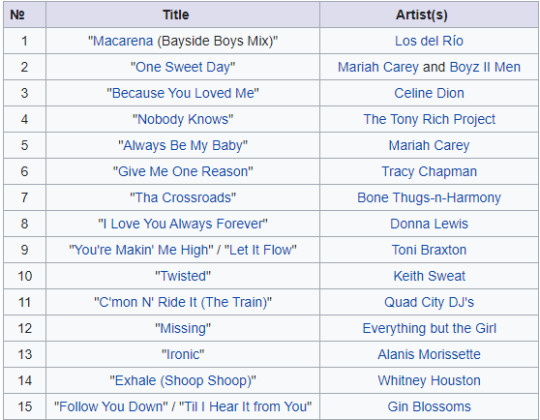
As the Macarena dominated the states, artists remained hard at work to pump out the next big music movement and you could really follow it all from the 90′s. of Ska, Swing music, spanish hits, techno, nu metal. It was a mad dash to be the next trendsetter. And the entire country was on the receiving end of the horrid trash that the 90s pumped out post grunge-era.
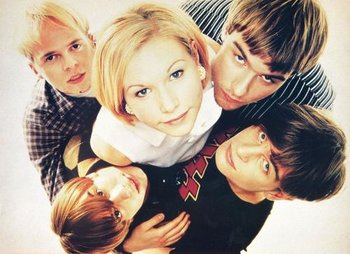
And then, there’s The Cardigans. A swedish indie-rock band that received acclaimed success, winning several awards for their Disco-Pop romance anthem: “Lovefool”. This led me to explore a question I had always asked myself, is a one hit wonder’s album worth checking out? And in this case I’d say yes, and allow me the pre-emptive correction of saying The Cardigans are not a one hit wonder. While their biggest song to this day will be “Lovefool” they have had some chart ranking songs but none ever matched the success of the song that broke them through on their 3rd album. Which is the album I’ll be reviewing today.
1. Your New Cuckoo
Beginning our journey is a Nu-Disco Pop jam that just leaves you wondering what you’re in store for. By now you know my affinity for nice, bassy songs and this delivers, with some very smooth guitarwork to boot. At this point I begin to wonder who calls the shots in determining the hits because the fact that the general public doesn’t know this song is pretty criminal. Definitely give this one a listen.
2. Been It
Along with amazing bass lines, I also enjoy whenever a track transitions perfectly into the next and this is accomplished perfectly here. With a bit of a harder edge, juxtaposed with lead singer Nina Persson’s soft vocals as she tells a tale of devoted love, playing the roles of everyone in someone’s life and coming at that crossroads where you realize you can definitely do better than what you currently got. Driving guitar and drums, its a great pop-rock song that opens doors for this familiar pop-rock in the 90′s.
3. Heartbreaker
This is a sultry, hypnotizing song that I really love, the bass line, the percussion, Persson’s voice is breathy and seducing, as she lazily sings about the fleeting passions of her heart. Produced with lush instrumentation and attention to detail. This is just all around a beautiful song that I had to listen to a couple of times because it really is an interesting choice of musical direction. The Cardigans are not a one trick pony as this album progresses, they’ve displayed strong roots with pop and guitar led indie rock, and this song just dives into the shallows of psychedelic rock, all respect to where it’s due but I can’t help but get strong Nancy Sinatra vibes from this song. From as it begins a light pop song, bends with some doom metal guitar vamping to fadeout, a really great song worth checking out
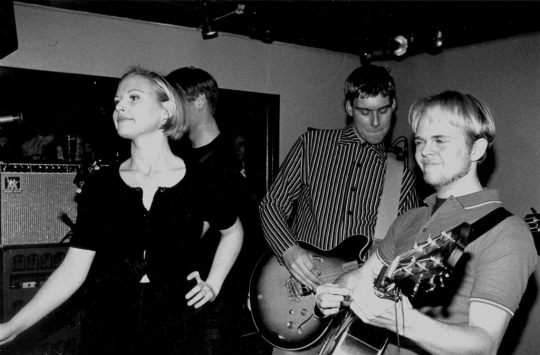
4. Happy Meal II
My first remarks are really about the drums that just stink of Ringo Starr. Which isn’t a bad thing. Playing on this psychedelic rock sound they lean into, this is their bubblegum pop entry into the album and I gotta say I’m not annoyed at anything here. A catchy hook, and Nina Persson’s voice again is just this sugar frosted cherry on top of this beautiful arrangement of percussion and guitar. This album keeps you interested as it twists and turns through it’s genres.
5. Never Recover
I get more Nancy Sinatra vibes here. Like a pop Bossa Nova, the drummer has times where he really shines and brings this amazing energy to these basic song structures, really makes even the most simplest of songs easy to enjoy. Nina’s lyrics don’t take themselves too seriously and come off sincere as she questions her own actions in the face of love. Lyrically competent between being the victim and also realizing one’s faults and the role that plays in the loneliness.
6. Step on Me
A tongue in cheek ballad that leans more into a rock genre but providing a genre-bending twist as only I’ve come to expect from the band by now. Playful and carefree, it’s a nice showcase of guitar work and Persson’s innocent harmless voice. Laying groundwork for alot of indie music of the 2000′s in my personal opinions, flip flopping between hard pop-rock and indie slow jam, its a testament to their unique use of every genre they touch.
7. Lovefool
I mean, we all know this song I’m sure or at least heard it once. Within the context of the album itself, this song gets lost to me, obviously strong enough to launch their career into stardom. It seems to lack a certain quality that I can’t quite pinpoint. Perhaps owing to the fact I’ve heard this song about a hundred times more than the rest of the album. It’s not a bad song, but to me, personally boring as the rest of the album is an absolute treat to the ears, especially if pop music is a guilty pleasure thing for you. Listen at your own discretion. But may I invite you to listen to the absolutely bitchin’ guitar portion that kicks in at 1:01. Just amazing.
8. Losers
Reminiscent of track 3 with its intro, we are led into another pop-rock standard experience. Once again a beautifully done transition from the previous track. Probably the most bleak song of the album as it begins with the lyrics “Close your eyes, look at all these losers/ You find them everywhere, they’re fucked up and annoying”. A song you could definitely see playing at the end portion of a CW show where the final thoughtful message of the episode is being narrated.
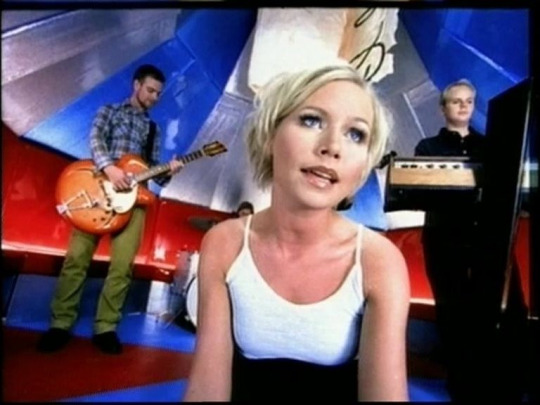
9. Iron Man
Black Sabbath cover. And easily one of the best covers of any song I have ever heard. EVER. And I mean it. A band from Sweden, arguably a birthplace for cold dark demonic harmonics and face paint-clad goth bands. Have absolutely every right to kickass this much. In their way of course. Heavy Metal takes a backseat as they turn this into a trippy deconstructed journey of the classic heavy metal anthem. Smooth and chill, it’s just an amazing cover. These guys made “Lovefool” for fuck’s sake, and they’re covering Ozzy better than most metal bands could ever hope to. Please listen to this song.
10. Great Divide
Back to the lush fields of bubblegum sugary sweetness, more symphony led than most of the songs on the album, comes off as a little broadway tune, largely forgettable in the context of the record. So many good songs in this album and I personally feel this didn’t meet the standards of the rest of the album. Lyrically strong, I don’t think it takes away from the album if it was skipped.
11. Choke
The send off track is a nice somber closer, reiterating their use of nu-disco, psychedelic sounds, an obvious love for that 60′s retro-rock. This song implements use of several horned instruments, as well as some flute that can be heard prominently in a few tracks. It’d be really hard to pin down exactly what genre this is as it wavers between alot of genres, as could be said for alot of their songs as they’re able to successfully blend these elements of soul, funk, disco and pop and become their own specific sound. (fans of Tame Impala may find something familiar in the nostalgic guitar and groovy basslines)
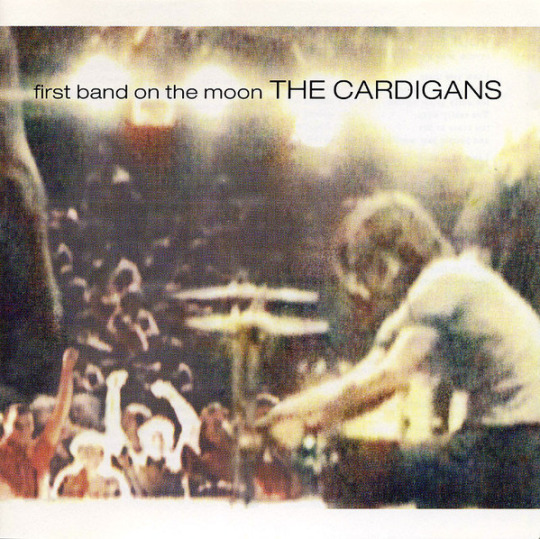
I can’t say this album is underrated because it scores fairly decently across the board with some prominent music reviewers, so I’ll say this is definitely an album everybody should check out. I’ll go out on a limb and say that in an era or chaotic post grunge, this is one band that kinda kept this pure Pop essence strongly in its foundation. Didn’t go the route of synthesizers and drum machines, but instead utilized a full band to make some of the most unique music you will ever please your ears.
Without The Cardigans, I don’t think you get a direct line to later acts like Avril Lavigne, Britney Spears, Hilary Duff and Miley Cyrus respectively. It’s pop without being too sugary sweet, and it utilizes every single instrument perfectly, every song feels perfectly engineered to hit that sweet spot and from my non-stop gushing I guess it’ll come as no surprise if I rate it.
⭐⭐⭐⭐⭐/5
I’ll admit, the album starts strong and burns out towards the end for my taste, only kept alive by the Black Sabbath cover, if you’re curious at all about this album, I highly recommend that song the most and checking out the album at least once.
#music review#album review#pop music#indie rock#the cardigans#black sabbath#first band on the moon#90s music#90s pop
1 note
·
View note
Photo
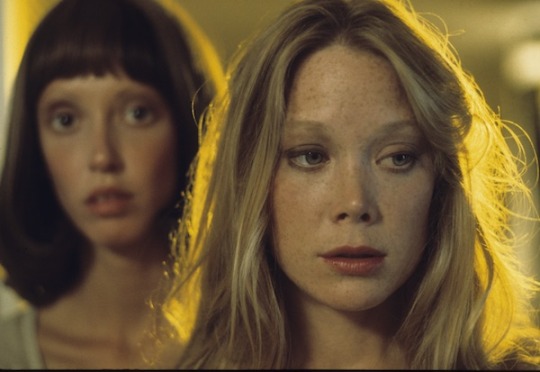
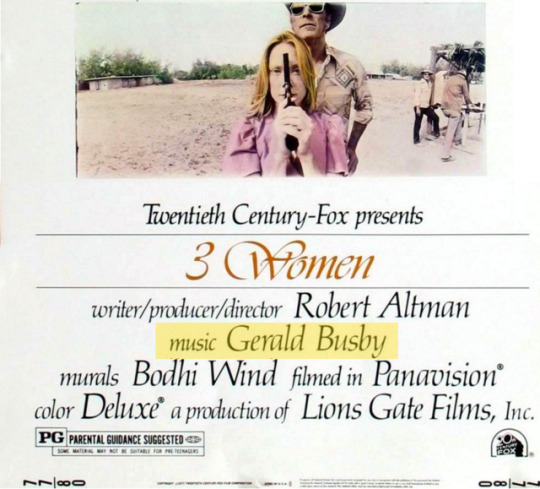
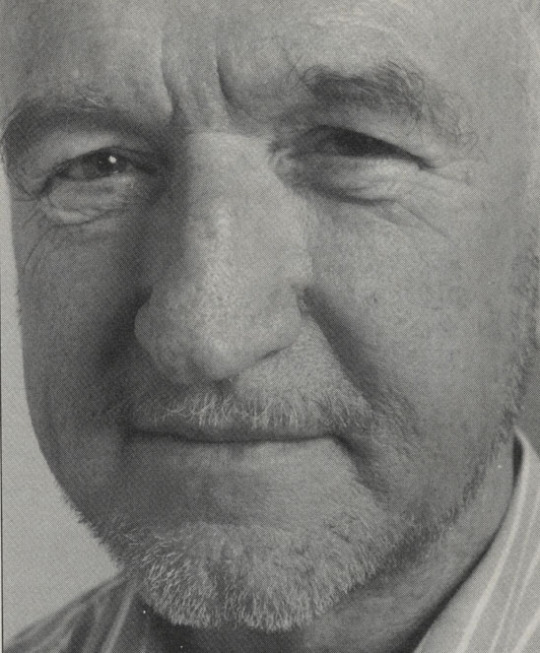
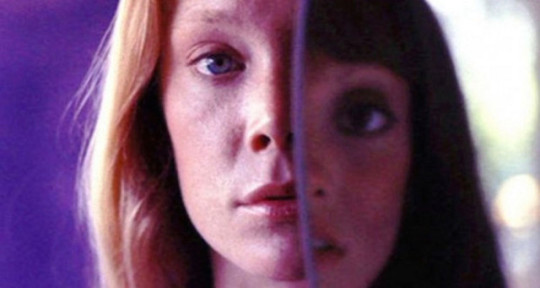
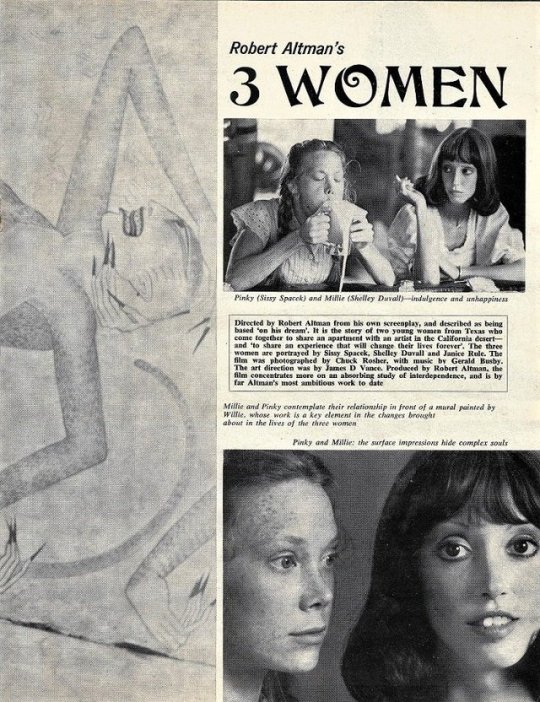
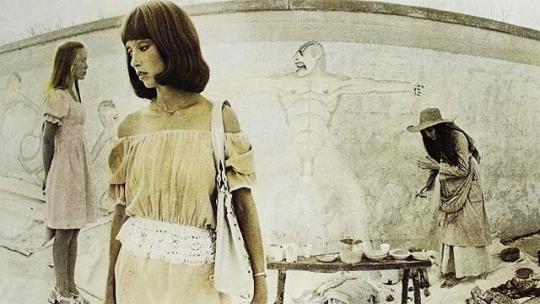


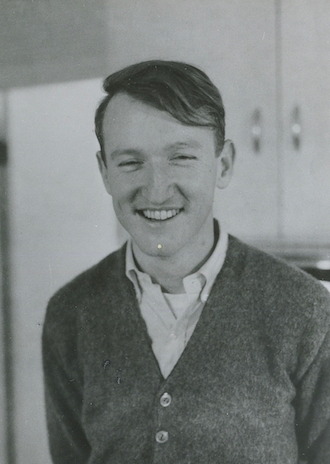
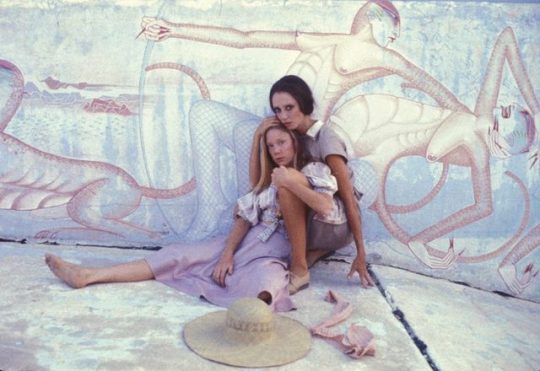
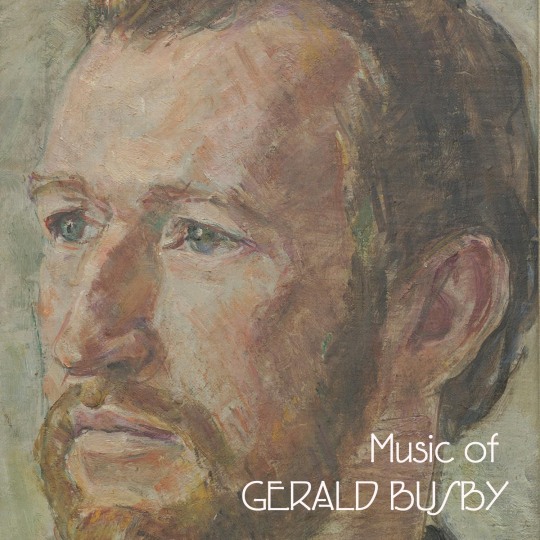
the Film Society of Lincoln Center’s 33-film series celebrating 1977’s diverse year in cinema, Robert Altman’s “3 Women,” notes the program’s press material, ``Only in the seventies could a filmmaker pitch a dream—with the intention to shoot the movie without a finished script—and get it greenlit by a major studio. Such is the genesis of 3 Women, Altman’s most psychologically haunting, offbeat, and visually captivating film. Stepping away from the narrative vastness of his previous Nashville and Buffalo Bill and the Indians, or Sitting Bull’s History Lesson, Altman presents his 1977 feature with a languid sense of dread and claustrophobia, in which three social outsiders (Shelley Duvall, Sissy Spacek, and Janice Rule) form an unusual bond around a Palm Springs health spa for the elderly. The film opened in New York in April that year and screened one month later at Cannes, where Duvall won the best actress award. An NYFF15 selection.” Gerald Busby, a longtime Chelsea Hotel resident and frequent arts contributor, wrote the film’s music. In anticipation of its 14 screenings at the Lincoln Center series, we asked Busby for his recollections of securing the assignment, then composing and recording the score.
BY GERALD BUSBY In April 1976, when I was 41 years old, my life was in the tempestuous and exhilarating stages of becoming a composer. My first commission, the score for Paul Taylor’s dance piece “Runes,” had come a year earlier, and it had been a success. Still, I was anxiously riddled about what to do next.
At the time, I was living with my boyfriend, Rafe Blasi, in a loft on Seventh Ave. and W. 27th St., just opposite the Fashion Institute of Technology. A giant metal trash container, used to collect debris from a building being demolished, stood at the curb just outside our front door. It was filled with arms, legs, and torsos from dismembered manikins and epitomized an only-in-New York scene. People walking by would reach into the pile of plastic limbs, pull out an arm or a leg, look it over, then toss it back into the container with a look of disdain. Rafe and I considered assembling a pile of arms and legs near the large windows at the front of our loft as an homage to the fashion industry. Rafe was a unit publicist for movies that were about to open. He wrote press releases and arranged screenings for critics. He knew other public relations people in the movie industry, including Robert Altman’s full-time publicist, Mike Kaplan. Altman in the late ’70s was writing, directing, and producing three films a year and selling them to 20th Century Fox for distribution. Alan Ladd Jr. was Altman’s contact and primary supporter at Fox, and he got a green light for “3 Women,” a film based on a dream and shot without a script in the desert near Palm Springs. It was a totally improvised movie, and it represented Altman at his most daring, willing to risk his money and reputation on a bizarre idea.
Rafe sent Altman a cassette containing a suite for solo flute I had just written called “Noumena.” The performance was by Michael Parloff, a brilliant young flutist just out of Juilliard, whom I met in a restaurant called Ruskay’s, where I cooked Sunday nights. Michael was hired to serenade the diners and played virtually every solo flute piece in existence. Over steaming carrots, I absorbed his beautiful flute sounds as I plated my filet of sole Helen Corbitt, a dish I created to pay tribute to the first chef I ever idolized. In the early ’50s, the original Neiman Marcus in Dallas hired Helen Corbitt to create a restaurant called the Zodiac Room. There, at the age of 15, I discovered the thrill of eating imaginatively conceived and skillfully prepared food. And now, as a cook at Ruskay’s, I was connecting with a virtuoso flute player who was to become the star of my first film score and the principal flutist with the Metropolitan Opera Orchestra.
“Noumena” impressed Altman enough to consider me, along with two other composers, for his new film, “3 Women.” But it wasn’t Altman alone who made the final decision. It was his staff of office workers and editors, as well as friends and actors he’d worked with, such as Elliott Gould, Lily Tomlin, and Peter Boyle. It was a late Friday afternoon when they gathered in Altman’s office for a drink and a little grass. When everyone was sufficiently drunk and stoned, Altman, asked for quiet, saying merely, “I want you to listen to some music.” Altman played music by each of three composers he had chosen, and he used a stop watch to determine exactly how long the group listened to each without commenting. The composer whose music lasted longest in silence was the winner. It was mine.
As I was writing the score in December 1976, Altman told me how he’d gone about finding original music for “3 Women.” “I wanted something abstract, something none of my staff had ever heard before and something they’d never on their own choose to listen to.” He found me in his Zen-like way, and I made a deal with him when he called to tell me the job was mine. I wanted Michael Parloff, who played my music beautifully, to be the flute soloist in the orchestra assembled to record my score. John Williams, who wrote music for Altman’s “The Long Goodbye,” chose every other instrumentalist in the ensemble, virtuoso studio musicians who could readily read modern music.
I was especially nervous about facing those ace musicians as I took the podium, to tell them, right off the bat, that I’d never conducted before. But I did it, then quickly added that my score was really chamber music (19 instruments), and I hoped they’d follow Michael’s example and just conduct themselves. They at first looked dismayed, then, as the session progressed, they took charge and corrected themselves and repeated takes they didn’t like. I was immensely relieved and flattered that my music had won their respect. It was Michael’s flute playing that really convinced them, and during the lunch break they paid him the ultimate compliment of camaraderie by exchanging stories and quips about how different things used to be for professional musicians. Two of them had studied with musicians who played in the NBC Symphony conducted by Arturo Toscanini.
The finished recording of my music for “3 Women” thrilled me. I had trouble grasping the fact that my first film score had been recorded by the best studio musicians in Hollywood, and it was for a Robert Altman film. I kept thinking of my brother Marion, 16 years older than I, who had been a high school band director in Texas, and was my first mentor and guide in music. How I wished he were alive and could hear my score for “3 Women.” It had passages that sounded like all the musicians he introduced me to in the early ’50s — Stan Kenton, the Four Freshmen, and June Christy. I felt certain he would love it.
Now, 40 years later, “3 Women” has become an international cult classic and is being featured by the Film Society of Lincoln Center this August, with 14 screenings. I still have trouble comprehending the reality of its success and the enduring devotion of fans around the world. Not bad for an East Texas Baptist who, as a teenager, toured the south with an evangelist named Angel Martinez and played gospel music to crowds of 3,000 in small-town football stadiums. That taught me how to write movie music, how to keep the show moving, and persuade the Bible-toting attendees to give their hearts to Jesus and put their money in the basket to keep our “Campaign for Christ” on the road.
My good fortune with “3 Women” continues. I have just completed an opera based on the film with a libretto by Craig Lucas and Frankie KL. This is another incarnation of Robert Altman’s extraordinary creation. I’ve dedicated it to his memory with love and deepest gratitude.
“3 Women” (runtime, 124 min.) screens as part of the Film Society of Lincoln Center’s “ ’77, a 40th Anniversary Survey of a Diverse Year in Cinema.” At 165 W. 65th St. (btw. Broadway & Amsterdam Ave.). For tickets ($14, $11 for students/seniors, $9 for members), visit filmlinc.org. Screenings on Fri., Aug. 18, 4:15pm & 8:45pm; Sat., Aug. 19, 4:15pm & 9:30pm; Sun., Aug. 20, 4pm & 8:30pm; Mon., Aug. 21, 4pm & 9:15pm. Tues., Aug. 22, 4pm & 8:30pm; Wed., Aug. 23, 4:30pm & 9pm; and Thurs., Aug. 24, 4:30pm & 9:15pm.
2 notes
·
View notes
Audio
This is an intermediate stage of the “background” to the piece I presented today in class. This is what I listened to (with a single ear effectively) whilst improvising the tentative and somewhat random sounding piano parts I added to this “background”. I’ve decided that each of the pieces I present this semester in this course will be modelled on the rather beautiful proportions of the prelude from Wagner’s opera “Tristan und Isolde” and be of that length as well.
I intend to make a full high-fidelity 4-channel recording of the failing, interrupted and “broken” file of the piece as heard after midnight outside the Coles at the end of Elizabeth Street (which is a different orchestral performance and recording to the one I have used here). I will compose a broken, fully notated and yet fragmented and tentative piece for piano to be accompanied by the fully spatialised recording of the way this “broken prelude” sounds in real space. I may then apply some of these same filtering, stretching and resonating techniques to the “realistic” recording so that gradually it acquires some of that same “oceanic” quality.
The placing of such a piece outside Coles in what I would describe as a pretty degraded and sometimes highly dangerous part of the city fascinates me. I’m not surprised (nor dismayed) to have heard Italian opera arias, Dvorak “New World Symphony” and other “warhorses” (interesting term that isn’t it?) used as sonic warfare against the drunks and "Blue Lotus” addicts that horizontally line the streets in this part of “the most livable city in the world”. I have walked many times past this supermarket and one night I noticed that this piece, the prelude to the opera I have seen the most times on stage, which I quote constantly and which is a clear point of origin for one important strand of early modernism (”expressionism”) was being played but the file was corrupted, gappy, coming in and out in a kind of microcosmic relation to the ebbs and flows of the original piece. That is, the rapid ebbing and flowing of the real sound was almost like a horrible parody of the vast ebbs and flows written into the score but which take place over long stretches of time. Even though the climaxes of each Act are positively volcanic in live performance a great deal of the music is delicate and quiet for very long stretches of time (another innovation of Wagner’s). Very little music before this piece has such a strong connection to water, the oceanic, the immersive. The 1st Act is set on a ship, the 2nd features a fountain (beautifully evoked in the music) and the 3rd act is set in a castle overlooking a calm and empty sea as a dying Tristan awaits the boat carrying his adulterous lover Isolde to him (there’s a beautiful essay by Susan Sontag about water in this opera). The words of the final “aria” where Isolde sings of the bliss of sinking into unconsciousness, singing of the breathing of the universe are an incredibly vivid image of the crashing of waves over a drowning person and re-appear repeatedly in pieces like “La Mer” by Debussy and the soundtracks of many Hollywood films dealing with the sea.
So outside Coles, after a terrible night of dealing with men wanting illicit sex, drunks wanting a place to rest, addicts begging for change, in a workplace full of all the dangers of the contemporary world I hear the achingly beautiful music of this prelude and instantly a whole world of associations opens up. My mind filled in the “gaps” of the broken file but somehow incorrectly. My piece is all about those gaps in the real that give rise to desire, by definition insatiable.
This opera is not just the world’s most pretentious “love triangle”, it is about the conflict between the world of the “day” (law, culture, property, the ego etc) and the “night” (symbolising the unconscious, the flow of desire, the impossible union of people in a community of two we call romantic love). In the story of the opera the Irish princess Isolde is carried across the sea to be married to a King by a knight Tristan (his name literally means sadness) who is the King’s nephew but they fall in love, a love which is consummated only in death and singing.
It is breathtakingly beautiful in a rare great performance. The chord in the third bar of the prelude has kept musicologists busy for more than a century and has been quoted by countless subsequent composers in a variety of ways: other than the beautiful quotation of it in Berg’s “Lyric Suite” (itself a coded love letter to his mistress) I find particularly interesting the change from Debussy’s entirely sincere usage of it to set the word “triste” in his early opera “Pelleas and Melisande” to the entirely sarcastic use of it in the “Golliwog’s Cakewalk” in the “Children’s Suite” for piano near the end of his life after his turn against Wagner in favour of a kind of French nationalism (need I point out the corrosive presence of a performative irony in the racial colouring of such a title?). It also celebrates (much like the incestuous relationship of Siegmund and Sieglinde in the Ring cycle) a revolt of desire against the merely “socially correct”.
This is a piece that attempts to avoid resolution by every means possible. It is ostensibly in A minor but look how many accidentals there are, how many times dissonances are held in suspension. The dissonant chord in the 3rd bar is really only resolved properly in the very last bars of the whole opera, some 3 hours later. Accordingly (pun intended) I had the comb filters constantly slide towards that resolution the harmonies seemingly desperately desire only to slide back again and again to the 3rd bar. At one point as well I engineered the tackiest possible resolution of the dissonance in the piano parts, poisoned by the difference in tuning between the “cultural” (and hence entirely “normalised”) tuning of 12 tone equal temperament and the second piano part which is tuned in accordance with the “natural” overtones of A (which sounds “out of tune”).
So this piece is in effect a kind of distorted memory of the original, a fantasy on its themes of intoxication and social control and an attempt to make the piece strange again now that it is safely ensconced in the “canon”.
I’m also considering making some new comb filters in Audiomulch tuned to the sometimes shockingly ugly sounds of the “Tristan chord” (B F D# G#) in other overtone tunings and making a piece out of those.
PS: this opera is also HILARIOUSLY vulgarised by Franz Waxman in the dreadful Joan Crawford film “Humoresque” from 1946. Waxman moves quickly from bits of the prelude, to the long love scene that takes up most of the second act, to the final act. He arranged these bits almost without regard to their actual harmonic and musical implications for violin and piano solos with full orchestra. It’s such a terrible piece of work that without fail makes me laugh because I recognise the harmonies enough to expect a particular consequence of a phrase then the music will jump at random to some other harmony when Wagner could probably spend 20 minutes getting from one to the other. When I first discovered this opera as a teenager (because I read that my then hero Schoenberg’s piece “Transfigured Night” was criticised as sounding like someone had smeared the score of Tristan while still wet and amusing you can hear my piece linked here as attempting exactly that) my mother who loved soppy Hollywood movies immediately recognised the music but hated the singing. Of course Wagner and this piece in particular is the source of more than 100 years of musical tropes illustrating “passion” or “pain” in music. It is of course incredibly beautiful in an overwhelming way and often reduces me to tears. Wagner is the Steven Spielberg of music but with the “machinery” as carefully hidden as the joins in phrases. He is also a masterclass in long range harmonic thinking and listening (I highly recommend diving deep into Wagner at an early age as it ameliorates your tendency to boredom and tunes your ears to resonate to harmonic moves stretched over the span of an hour or more). Of course, what makes this malignantly seductive music fascist to the core isn’t its occasional forays into a “military” soundworld but rather its dedication to aesthetic illusion above all, its beauty and its desire to flood the listener with sensation that you cannot take a critical distance from. Wagner is, as Adorno pointed out, fascist to the core not because of his terrible words about Jews but because of its commitment to art as a kind of magical spell that dissolves the individual and their borders. I also think that Philippe Lacoue-Labarthe was entirely correct to think of National Socialism as National Aestheticism: only in German does “ugly” also mean “hateful”. It amuses me therefore that Wagner’s music ended up in a ridiculous Hollywood melodrama, mutilated and stitched back together like Frankenstein’s creation by a Jewish emigre composer in Hollywood. To use one of Hitler’s favorite operas (Hitler is of course the locus classicus of the toxic opera queen) after the “victory over fascism” for a Joan Crawford movie about the redemptive power of art is camp as fuck (precisely because it is done with an entirely straight face). The fact that I have seen with my very own eyes people swoon with delight over this shoddy piece of work makes it even funnier: possibly the worst idea of Western civilisation is the neo-Platonist identification of the beautiful with the true and the good. One of the reasons for my intense interest in the fate of “culture” during the Third Reich is the manner in which the highest ideals of western civilisation are finally revealed there (by the very “people” that invented some of them) as a cheap veneer over barbarism: Adorno was correct to say that after Auschwitz both culture and its urgently necessary critique (ie. his own life’s work) are garbage.
There’s an awfully vulgar video of the Waxman “Tristan Fantasia” on Youtube that illustrates almost everything terrible about “Western classical music” and how it now functions as an ideological apparatus.
https://www.youtube.com/watch?v=YOrRAvmUV2c
1 note
·
View note
Text
Linkin Park in Brixton Academy, London (04/07/2017) and in Barclaycard Arena, Birmingham (06/07/2017)
When I started writing this review its tone was quite different from the one I’d like to apply now. Never in a million years I’d think it was the last time I saw Chester Bennington onstage.
Now “one in a lifetime opportunity” gains whole new meaning. Unfortunately. And what was supposed to be a sentimental journey turns into eulogy.
Linkin Park is one of the bands that shaped my musical taste. They're one of the bands that helped me through some tough times [sic.] when I was a teenager. I remember recording one of the first albums on the cassette (!) - well, doing a copy, cause I couldn't afford the original. I was listening to it so much the tape broke (I did buy a CD eventually, but I'm still pretty bummed about that cassette even if it was ages ago).
Having that said: it was “an one in a lifetime opportunity” to see Linkin Park in relatively small venue (only few thousands compared to arenas or stadiums). Especially that my previous concert encounters with LP were: 1) standing outside the stadium in my city, listening to them and singing all those songs that meant so much to me (it was a show with Pearl Jam) and 2) another stadium, this time with Fall Out Boy, years later, nowhere close with my GA ticket (after LP Underground, Early Entrance, Golden Circle and loads of fans who arrived earlier that I did, cause I was going from another show in another city). So Brixton Academy sounded absolutely insane. Plus I had this crazy idea to get nice spot on the front row (quite ambitious too, considering the fact that again I was going from another city after Green Day's show – that's another story to tell, though). And somehow [and with loads of nerves strained and lost in the meantime] I achieved that goal.
If I wasn't enough I got to meet Mike and Chester after the show – my teenage self couldn't contain it and was crying inside out of pure joy. It was one of those moments when you say: “meet your heroes”. I feel very privileged that I could and that I told them that.
The show itself was absolutely top class. They brought Stormzy for 'Good Good Bye' and people went ballistic (like many times before and after that song, obviously). If felt special – maybe the singalong was missing [at least] few thousands throats but it was as powerful as any other. Sea of lights flickering in the dark was as intimate as it could be, touching and beautiful response to acoustic songs.
Linkin Park were in fantastic shape so the show was sensational – there was no missing a beat or tune; entertainment was the priority and fans were treated like royalties. Lights' arrangements were spot on – even though they had to be adjusted to the smaller venue (the weight, the size, etc.) since they were built for arena tour. Even if it was challenging all the effects were perfect and natural – no one would have notice changes.
The set was long and it was everything a fan could ask for: the old, the new, the fast, the slow mixed and matched to create killer show. It wasn't boring 'song after a song' exactly like on the album versions. Various changes added a bit of a flavour here and there: longer outro, shorter version smoothly linked with another song, remix ('Numb/Encore'), acoustic version...
Piano version on 'Crawling' didn't really need much of drum and guitars, 'cause the crowd sang it beautifully unison unfolding the song's strength with each verse. 'In The End' (obviously) had impressive singalong.
The electro/pop turn in Linkin Park's tune even though softer sounded very well, 'Heavy' had pretty nice response (no 'boos' or anything like that, people simply had fun), ''Nobody Can Save Me' had this tangible, gentle and touching vibe. But it was the old ones that released the anger, eased the pain screamed out loud with lyrics, loud and clear with machine gun speed.
Union Jack signed by fans was proudly displayed at Mike's keyboard and thanked for. Chester said with a little bit too much pride that Linkin Park's fans are the best fans in the world (even though many bands make the claim only few mean it and not always the fanbase deserves it, but here all's very true). And if lights, praise and special guests weren't enough the audience was showered with balloons with LP's initials released at it at some point of the show.
Emotional and passionate show, devotion showed from both sides, bond stronger that blood.
The concert in Birmingham was the last one of that leg of the tour, since Manchester has been cancelled, because Arena is being rebuilt after the attack [suicide bomber at Ariana Grande’s concert]. Chester addressed the tragic events in emotional speech, condemning the violence and uniting with the victims (and pointing at his earrings with a bee he added he would wear them until acts like this are over). ‘Battle Symphony’ embraced the crowd in delicate veil, lights flickered and voices indeed were a symphony after all. ‘Points of Authority’ has been replaced with ‘From the Inside’.
The show was bigger, more powerful, more spectacular, but beautiful all the same with thousands of people singing their hearts out. Even though the venue and the stage was bigger the vibe was insanely intimate. Warmness pouring into hearts, connection undeniable and joy exploding with screams, singalongs, throwing fists and waving hands. But it was sweat, heat, headbanging and mosh pits as well - perfect contradictions meeting and melting into one. Just like the opposites in Linkin Park’s music and mix of genres and new directions explored tirelessly.
It’s safe to say that the latest record of Linkin Park gains a painful depths and there’s another light shed on lyrics. Unfortunately. How many of fans choke on words like:
‘ (...) Who cares if one more light goes out? Well I do’ [One More Light]
I believe that this is how we all want to remember Chester - pure energy, live fire onstage with bright eyes and wide smile looking back at yearning faces of Linkin Park’s fans.
Rest in Peace. You will be truly missed. You inspired many.
#Linkin Park#one more light world tour#O2 Brixton Academy#Barclaycard Arena#london#birmingham#chester bennington#rest in peace#Concert Review#rock music#pop rock#alt rock#nu metal#electro pop
0 notes